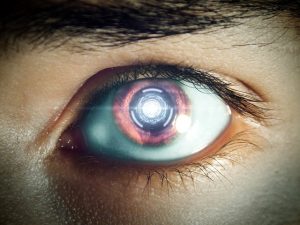Passport to your soul

Have you ever watched a naughty video online?
Have you ever asked Google your most private thoughts; or left a YouTube comment you’d rather your colleagues didn’t see? Well, Boris Johnson knows – and he’s going to use it against you to make sure you behave yourself.
Personal data had been used to silence a political dissident
While Brits have been fuming about vaccine passports this week, a story from the States has gone under the radar. Earlier in the year, Monsignor Jeffrey Burrill, the general secretary of the US Conference of Catholic Bishops, strongly supported a measure for the Catholic Church to deny Joe Biden communion based on his abortion stance. This week, a small Catholic blog released an article in which they had bought anonymous user data from Grindr (a gay sex app) and de-anonymised it using location inferences (i.e., knowing where the Monsignor lived). Burrill was outed as gay, and a hypocrite, and his life and political potency were crushed. It seems someone had rid Biden of this meddlesome priest.
In short, personal data had been used to silence a political dissident.
This is why vaccine passports will destroy liberal democracy as we know it. They will be like Cambridge Analytica on crack. I should know: I used to be the Lead Psychologist there, and yet vaccine passports’ ramifications for data privacy and psychological manipulation are so concerning that even I have a problem with them.
To begin with, one must understand just how powerful data analytics already are. For instance, Spotify owns a patent to determine personality not only from your music but also your passive usage data, and to use that insight to send targeted recommendations and ads. An academic paper revealed, by way of illustration, that conscientious people are less likely to listen to comedy on Spotify, and more likely to have a premium account (Anderson et al., 2020). Elsewhere, personality has been linked to things like Facebook likes, app usage, email addresses, book reviews, Tweets, and much more (e.g., Hinds & Joinson, 2019). Those conscientious people are more likely to save money, read history books, and like law enforcement groups on Facebook (Annalyn et al., 2018; Gladstone, Matz & Lemaire, 2019; Kosinski, Stillwell & Graepel, 2013).
Elsewhere, the paper Can Machines Read our Minds? (Burr & Cristianini, 2019) outlined how data can be used to predict things like intelligence, wellbeing, mood, politics, autism and depression. What’s more, computer judgements of personality tend to be more accurate than those of humans (Hinds & Joinson, 2019), and one algorithm based on Facebook likes could, on average, predict personality better than your colleague, roommate, friend, or family member (Youyou, Kosinski & Stillwell, 2015). The only person who knows you better is your spouse — unless the algorithm has 300 or more of your Facebook likes.
Moreover, these algorithms can not only estimate your personality, but they can actually read your mind. You know that Facebook can guess your politics; well, your politics are linked to your sexual preferences, with liberals being more likely to prefer threesomes and conservatives spanking (McLaughlin, 2017). In theory, Mark Zuckerberg knows what you like in the bedroom. Indeed, academic research has shown that your sexuality can even be predicted from your profile picture (Wang & Kosinski, 2018). The predictive algorithms can get right inside your head and capture the things you might not want them to know.
Ultimately, these predictive insights can be (and are) used for hyper-personalised nudging. Imagine how effective ads could be if they knew your most personal desires and insecurities. It is clear that cognitive biases, aesthetic preferences, and content consumption differ by personality type — such that a conscientious person, for example, is more likely to be influenced by simple aesthetics, utilitarian arguments, and commitment and consistency appeals (Chamorro-Premuzic et al., 2010; Chen & Lee, 2008; Motzek, Kos & Gupta, 2011). One study found that Facebook ads had up to 50% higher conversion rates when they targeted personality (Matz et al., 2017).
These algorithms can not only estimate your personality, but they can actually read your mind
Bear in mind that this capability is all based on rather simple behavioural data. The growing ubiquity and sophistication of biometrics like facial coding will only make the algorithms even more invasive and accurate, and the nudges even more influential. It recently emerged that Spotify won a patent to analyse ambient noise to predict in-the-moment music preferences. For a true glimpse into the future, consider that Elon Musk’s Neuralink claims to have enabled chimpanzees to play Pong against one another using only chips threaded into their brains. In just a few years, the algorithms will perhaps be able to read your mind directly from the source.
Klaus Schwab, co-founder of the World Economic Forum, pioneered the Fourth Industrial Revolution and Great Reset concepts — essentially arguing that all human life will be digitised, and that COVID-19 presents a unique opportunity to make it happen. This is no kooky conspiracy theory: the UK’s health secretary Matt Hancock even gave a glowing speech on the Fourth Industrial Revolution to Parliament in October 2017. Discussing technology in the near future, Schwab has written that “the Fourth Industrial Revolution will lead to a fusion of our physical, digital and biological identity… [This will be a result of technology which] will almost certainly become implantable in our bodies and brains…”
There is a significant risk that this technology will be malign. A study found that transcranial stimulation — that is, exposing certain parts of the brain to magnets — could be used to disable threat-processing and accordingly change political attitudes, making people less religious and more open to immigration (Holbrook, Gordon & Iacoboni, 2018).
This will be the Cambridge Analytica of the future. Your digital footprint and biometric traces will let algorithms know if you’re so much as thinking of voting for the wrong candidate, and you will be nudged out of it with messages so subtle and persuasive you didn’t even know they were there; or perhaps you will have your mind changed, literally, by your embedded Neuralink device.
These tech advances must be considered alongside social changes. Protest and even speech are being criminalised under the guise of security and misinformation — Biden recently said Facebook is “killing people” for not imposing censorship — while technology makes detecting and suppressing this “wrong thinking” ever more possible, even in private conversations. People are being “cancelled” and “deplatformed” for their views (on all sides of the political spectrum), and this is not just limited to the internet: people are losing their jobs and even being banned from payment processors like Visa.
Imagine — the year is 50 PR (Post Reset). You are trying to get into an Amazon supermarket to buy a bug burger for dinner. The facial recognition software scans your face and flashes red; the door locks and denies you access. Your smartphone recently overheard you speaking critically of the government: you must go home and quarantine, where your smart lock will only allow you out once it has been determined that you are no longer at risk of spreading these contagious ideas. You have to do your part to flatten the curve of viral misinformation, after all. It’s for the greater good.
The passports act as a behaviourist’s paradise, conditioning people with punishment and reward
Vaccine passports are the lynchpin for this Hellish vision because they provide a central identity against which all of your data will be mapped (“Facebook as your birth certificate”). Your purchases, your Facebook likes, the locations you visit, the people you see, and even the content of your conversations, will all be connected to a single online identity. Already, we are seeing movements to allow social media access only with a verified ID. Vaccine passports are also a huge leap forward in terms of social engineering: by allowing or denying access to services (both on- and offline), the passports act as a behaviourist’s paradise, conditioning people with punishment and reward.
The key to such massive social change is what the Behavioural Insights Team call “radical incrementalism”. Consider it like compound interest, or “boiling a frog”: tiny changes meet little resistance but make a huge difference over time. This is how the government has operated under COVID-19. Whether it’s lockdowns, face masks, or vaccine passports, politicians have followed the same three-stepped approach: deny, then debate, then demand. The initial denial puts people’s fears at bay, while seeding the idea so that it is more palatable in the future; then, once the foot is in the door, the dial is slowly turned up. Just a few months ago, the government denied that vaccine passports would happen; today, they are introducing them, while denying that they would be used in supermarkets.
The government will say anything to get people to accept vaccine passports in principle today — including that they will be temporary and will only apply to certain venues. Once the vaccine passports are accepted, politicians will be able to move the goalposts with the minimum of resistance. In reality, the passports are likely to be only for nightclubs in the same way that the lockdowns were to be only for a few weeks.
In The Gulag Archipelago, Aleksandr Solzhenitsyn elucidates on this “foot-in-the-door” technique: “At what point, then, should one resist? When one’s belt is taken away? When one is ordered to face into a corner? When one crosses the threshold of one’s home? An arrest consists of a series of incidental irrelevancies, of a multitude of things that do not matter, and there seems no point in arguing about one of them individually… and yet all these incidental irrelevancies taken together implacably constitute the arrest.”
As the global powers are trying to get their foot in the door with vaccine passports, it is critical that we slam that door shut now, and bolt it permanently. Pandemics, as awful as they are, come and go in relatively short spans of time. Periods of oppression can last for centuries.










